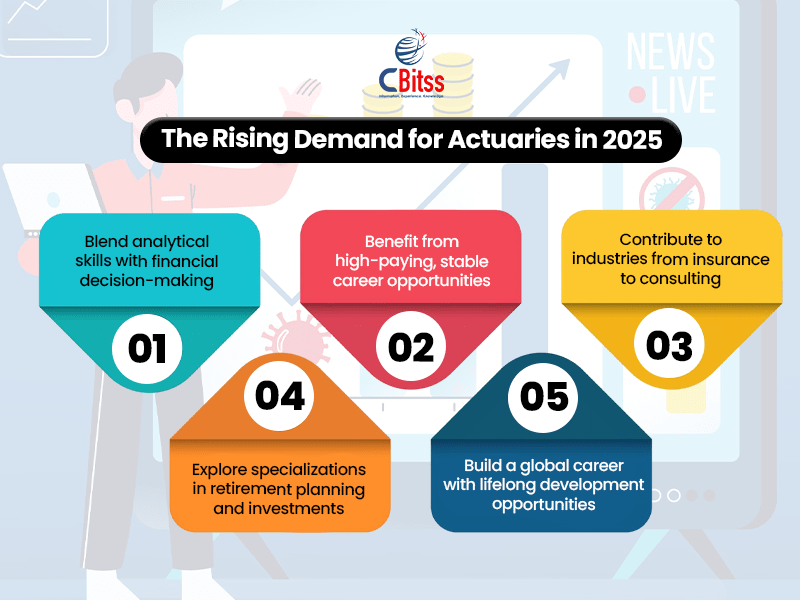Table of Contents
ToggleWhy Actuarial Careers Are in Demand? If you are curious about how to become an actuary, you are thinking about one of the best and most respected careers in the financial and risk management field. Actuaries also apply mathematics, statistics, and business acumen to enable organizations to evaluate and deal with risk. Actuaries are also important in the formation of strategic decisions with various industries, like the insurance and investment firms, after employing skilled professionals.
It is significant to know how long to become an actuary and how hard it is to become an actuary. It takes discipline, examinations, and professional education. Nevertheless, the profession has a high potential for earning, stability of employment leading to specialization, hence it is an appealing career to people with analytical minds.
For foundational business skills that complement actuarial knowledge, check out the importance of a website for your business success.
Steps to Become an Actuary
How to become an actuary is a combination of schooling, exams, and work experience. The common procedure consists of:
Earning a bachelor’s degree in math, statistics, actuarial science, or a similar subject.
Passing initial actuarial exams in probability, financial mathematics, and risk management.
Acquiring professional experience by using internships or entry-level jobs.
Passing level 3 exams to be a fully qualified actuary.
Knowledge of how long to become an actuary required to be an actuary is based on the success in exams and the amount of experience gained. The time to become fully professional can be 5-7 years after the commencement of the undergraduate education. Practical time at an early age is necessary, such as internships.
Explore Do you provide stipend programs to gain financial support during internships?
Educational Requirements for Actuaries
- Good base in mathematics and statistics.
- Economics, finance, and computer science coursework.
- Networking in actuarial societies or actuarial clubs.
- Internships or cooperative education in insurance, pensions, or consulting companies.

Professional Exams and Certifications
- Associate of Society of Actuaries (ASA): contains probability, financial mathematics, and actuarial modeling.
- Fellow of Society of Actuaries (FSA): Specializes in more complicated actuarial areas, including life insurance, pensions, or enterprise risk management.
- Enrolled Actuary Designation: Applicable in the field of retirement plans and pension consulting; responses on how to become an enrolled actuary.
Skills Required to Succeed as an Actuary
Other than technical knowledge, do future actuaries require:
Critical thinking is required to process complicated data.
Good communication skills to articulate findings to non-technical stakeholders.
Corporate wisdom in assessing financial and insurance risks.
Programming in such tools as R, Python, or Excel to model.
These are skills that define the effectiveness with which actuaries can find solutions and give practical information.
Programs like boost your self-confidence when speaking help refine communication skills critical for presenting complex analyses.
Start learning mathematics, finance, and statistics the smart way today
Join the Network of Future Actuaries
Common Challenges in Becoming an Actuary
- Professional examinations are difficult.
- Prolonged certification, find out how long does it take to become an actuary.
- There is stiff competition in the case of internships and early career jobs.
- Striking a balance between work and study.
- Knowledge of these issues will ensure that candidates strategize and are motivated.
Career Paths and Opportunities for Actuaries
Actuaries can specialize in a variety of areas:
- Insurance: Risk of life, health, or property insurance.
- Pensions: Planning retirement and assessing the liabilities.
- Finance: Investment risk, portfolio management, and derivatives.
- Consulting refers to risk, solvency, and strategic planning advice for firms.
- Enterprise Risk Management: Corporate Risk Analysis and mitigation measures.
These choices demonstrate the flexibility and high earning ability of the career.
How Long to Become an Actuary: Realistic Timelines
To answer how long does it take to become an actuary, the typical time required by the candidates is 5-7 years to finish their education and examinations. Others gain an associate status in 3-4 years and a full fellowship in 2- 3 years. It is necessary to keep learning because actuarial work changes with time, with the introduction of new financial instruments, technology, and changes in regulations.
Internships and Early Career Experience
It is very important to get experience when learning how to become an actuary. Actuarial insurance company, actuarial consulting, and actuarial pension internships expose an individual to the real world of the actuary. They assist you in using what you learned in the classroom, professional networking, and learning about the day-to-day duties. Expenses during early career also enhance your chances of passing exams and getting permanent jobs.
For ideas on preparing professionally, see what your past students are doing two or three years later.
Technology and Actuarial Tools You Should Know
Technology is important to modern actuaries. Key tools include:
Excel and VBA: In data analysis and modeling.
R and Python: To do statistical computing and predictive modeling.
SQL: To deal with big data.
Tableau or Power BI: To visualize data and make findings.
This is because the more these tools are learned at an early age, the easier the journey to becoming an actuary will be, and the question of how hard is it to become an actuary will have been answered.
For skill-building, check tips for fluent English speaking to improve reporting clarity.
Learn actuarial science and data risk analysis with hands-on projects
Continuing Education and Professional Development
The actuarial careers are a continuous learning process to keep up with the certifications and remain competitive:
- Visit workshops and conferences in actuarial societies.
- Enroll in webinars and online courses on the preparation of exams and advanced subjects.
- Read publications and research papers in the industry to keep up to date.
- Earn additional (complementary) financial or risk management certifications.
- Participate in professional networks to share knowledge with other professionals.
- Such measures will make actuaries efficient in their careers.
Additional training in communication and leadership can be found at why personality development course is a must.

Find the Right Actuarial Path for You
Conclusion
Therefore, when you ask how to become an actuary, remember that it is a challenging yet very fulfilling profession. Using well-defined education courses, successful performance in professional exams, early working experience, and excellent analytical and communication capabilities, it is possible to build a safe and well-paid career. The awareness of how long does it take to become an actuary and how hard is it to become an actuary also enables one to have realistic expectations and remain motivated during the journey.
Begin your actuarial career. Get to a sound level of knowledge in mathematics and statistics, take up preparatory courses, do internships, and keep learning professional skills. You have the ambition to either find out how to become an enrolled actuary or become a complete professional; in any case, you are better off being prepared early.
Begin studying for preliminary exams and complement your learning with resources relevant to actuary to broaden your business perspective, and take the first step toward a successful actuarial career!

Sukhamrit Kaur is an SEO writer who loves simplifying complex topics. She has helped companies like Data World, DataCamp, and Rask AI create engaging and informative content for their audiences. You can connect with her on LinkedIn.







